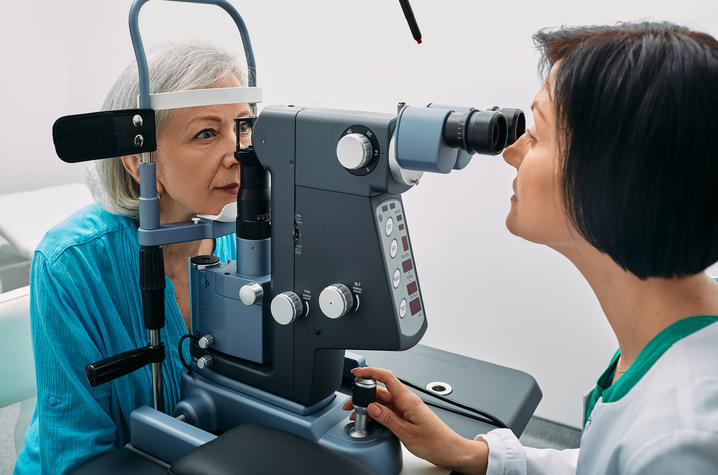Save your sight: learn about prevention, treatment for glaucoma

The University of Kentucky Public Relations and Strategic Communications Office provides a weekly health column available for use and reprint by news media. This week's column is by Elham Ghahari, M.D., assistant professor of ophthalmology at UK HealthCare Advanced Eye Care.
LEXINGTON, Ky. (Jan. 29, 2024) — Glaucoma is a disease of the optic nerve that can cause vision loss. It is the second leading cause of blindness in the U.S. and the leading cause of irreversible blindness worldwide.
What is glaucoma and what causes it?
Glaucoma is the leading cause of global irreversible blindness, and 111.8 million people worldwide will have glaucoma by the year 2040.
Glaucomatous damage is the loss of the optic nerve cells which leads to characteristic changes in the optic nerve head with concomitant visual field damage. Glaucoma cannot be cured, but it can be controlled and stabilized with proper treatment.
Primary open-angle glaucoma is the most common form of glaucoma and is associated with several risk factors such as family history, African ancestry, other eye diseases such as diabetes or inflammation, past eye injury, and elevated intraocular pressure.
At what age should people become concerned about developing glaucoma and what are some risk factors?
Abnormally high eye pressure is the most important glaucoma risk factor because it is the only modifiable and effective target of the therapy for glaucoma. Although some forms of glaucoma develop even when the eye pressure is normal, the risk of abnormally high eye pressure increases with age.
Early detection and intervention can help prevent vision loss from glaucoma. However, most patients don’t know they have the disease because it is generally asymptomatic in the early stages, which means symptoms don’t present themselves.
A routine eye exam can identify the risk for glaucoma and early signs of the disease. During an eye exam, glaucomatous optic nerve damage can be assessed by clinical examination of the optic nerve head and eye pressure can be checked.
The risk of having abnormally high eye pressure as the most important risk factor for glaucoma increases with age. Glaucoma screenings are suggested beginning at age 40 and should continue after that in intervals suggested by your eye doctor (usually every 2-4 years.)
What are some warning signs someone might be developing glaucoma?
There are usually no early symptoms of glaucoma, so screening exams are very important. Gradual dimming or weakening of vision is sometimes reported. Some patients with acute glaucoma develop severe eye pain and rapid visual changes.
How is glaucoma treated?
Glaucoma treatment consists of reducing eye pressure using medications, lasers or surgery. Most glaucoma patients can be stabilized with prescription eye drops or in-office laser treatment.
Once the pressure is stabilized, it is important to continue regular follow-ups to make sure the pressure remains low enough. Less frequently, glaucoma surgery may be required.
UK HealthCare is the hospitals and clinics of the University of Kentucky. But it is so much more. It is more than 10,000 dedicated health care professionals committed to providing advanced subspecialty care for the most critically injured and ill patients from the Commonwealth and beyond. It also is the home of the state’s only National Cancer Institute (NCI)-designated Comprehensive Cancer Center, a Level IV Neonatal Intensive Care Unit that cares for the tiniest and sickest newborns, the region’s only Level 1 trauma center and Kentucky’s top hospital ranked by U.S. News & World Report.
As an academic research institution, we are continuously pursuing the next generation of cures, treatments, protocols and policies. Our discoveries have the potential to change what’s medically possible within our lifetimes. Our educators and thought leaders are transforming the health care landscape as our six health professions colleges teach the next generation of doctors, nurses, pharmacists and other health care professionals, spreading the highest standards of care. UK HealthCare is the power of advanced medicine committed to creating a healthier Kentucky, now and for generations to come.




